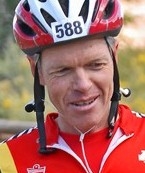The 2007 Moab Century ride was an event I will never forget.
It started as a cold, overcast day. A light drizzle began falling as hundreds of colorful riders wound their way along Highway 128. Off in the distance the towering peaks of the LaSal Mountains were hidden in the clouds. Since the rain was sporadic it was easy to feel optimistic, but as we neared the steep mountain ascent, the clouds grew more ominous. The rain, while not heavy, fell more steadily and then it turned to slush.
With the wind at our backs and the warmth generated from climbing, the soggy ascent to Fisher Mesa was deceptively tolerable. We weren’t fully aware of what we were getting ourselves into. It was like the subtle treachery a dreadful beast would use to lure unsuspecting prey into its lair. After all, there would be food and shelter at the top.
Unfortunately, it was too cold to linger, and the wind eventually blew down the shelter.
As soon as conditions deteriorated, the upper portion of the course was closed. However, a number of riders had already pushed ahead. Support vehicles had been dispatched but were at least an hour away.
The descent was brutal with blowing snow and bone chilling windchill. If I exceeded 15 miles an hour my bike began shaking uncontrollably. At first I thought something was wrong with my bike, but soon realized it was my numb and cramping muscles causing the shakes.
The rims of my wheels screeched loudly as hand brakes were vigorously applied. Every half mile I stopped to brush the snow off and to rest my aching arms.
Some riders were walking their bikes, others were huddled together by the side of the road looking for shelter. A slow feeling of desperation began to gnaw at me, but I knew the best thing to do was just keep going, to get out of this mess.
Reaching the gravel pit aid-station I found a swarm of riders tightly huddled around two fires. Eventually, the rain stopped. Riders were shaking uncontrollably and teeth wouldn’t stop chattering, but at least we could feel some warmth.
Soaked to the skin, the prospect of continuing to ride into a cold headwind was just too much. Aided by the fire, I eventually warmed up, dried out, and continued on.
By the time I reached the River Road the sun had broken out and I was feeling much better. So, instead of turning left and heading for town, I turned right and headed out to Dewey Bridge.
The wind was temporarily my friend as it pushed me along, but I knew I would pay for it on the return trip. There weren’t a lot of riders on the road at this point. Many had been done-in by the wet and cold, and others skipped the 30 mile loop to Dewey.
Somewhere along that stretch of road a painful side-stitch developed that I couldn’t shake. My anticipation of finding relief and refreshment at the Dewey Bridge aid-station went unfulfilled.
The unrelenting headwind made the long trek back to town a final plodding challenge. Remaining riders were few and far between, and any inclinations toward teamwork were overcome by fatigue and the singular focus that comes when the survival mindset.
I finally rolled into town nine hours after I started. It had been a long, hard day. My stomach cramp made it impossible to eat anything at the finish. I sipped some water and visited briefly with a friend. For me, the much anticipated meal was not to be.
So what is the moral to this story? What was the lesson learned from all of this?
Somewhere along that last stretch of scenic highway through the river corridor, as I was toiling along and thinking how difficult the day had been (I’ve never been so miserable on my bike before) a thought struck me.
Part of the motivation for this event was raising funds for cancer research. I was riding for my father, who was battling cancer at the time. This was the inner force that kept me going.
In my wretched condition my eyes were opened. Suddenly my focus shifted from what “I” was dealing with to what “others” were dealing with. In less than half an hour I would be home, relaxing, resting and recovering. My suffering would be over and the toil of the day would become a distant memory. But for those struggling with cancer, there was no rest or relief in sight. This was a sobering realization that flooded over me with emotion.
The message was driven home more powerfully because of what I was experiencing. It completely flipped my perspective. Instead of remembering the day as a disastrous experience I would like to forget, it became one of greater appreciation and filled me with gratitude for life, health, family and friends.
Keeping in mind the mission of such events – helping those with cancer – it wouldn’t seem proper to always have fair skies, pleasant temperatures, and no wind or rain. A little suffering is beneficial if it enhances our understanding, deepens our appreciation, and expands our compassion for others.
My post-script for the day, “A terrible day cycling is still better than a good day with cancer.”



